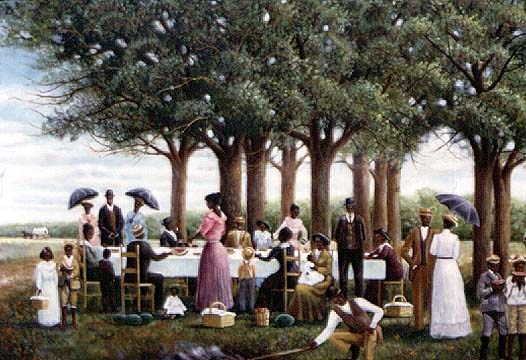
Friday – Juneteenth
I came across this poem by poet Sojourner Kincaid Rolle commemorating Juneteenth, the moment (June 19, 1865) when union troops under General Gordon Granger made Lincoln’s Emancipation Proclamation a reality in Texas. Juneteenth received new attention when Donald Trump announced plans to launch his 2020 presidential campaign on that day—and to do so, furthermore, in a city which, 99 years ago this month, suffered the worst massacre of African Americans in American history. All this, of course, occurs at a time when the country is reeling from massive gatherings protesting George Floyd’s death and other acts of police brutality.
Slaveowners had, of course, ignored Lincoln’s proclamation, even after Confederate General Edmund Kirby-Smith officially surrendered in Galveston. Only with the arrival of General Granger could slaves shout, “Free at last, hallelujah, I’m free.”
[Side note: I name the Confederate general because his descendants were a significant part of my life growing up in Sewanee, Tennessee. The general came to the newly founded University of the South as a math professor, and I had two Kirby-Smiths as doctors, one as my seventh grade English teacher, and a couple as childhood friends. Although the Civil War was a hundred years in the past, it felt to me as though the passions that had triggered it were still alive and well, which is one reason I fled to a northern college. In 2017, incidentally, Sewanee quietly renamed the Kirby-Smith monument, which sits in the middle of the town, and moved the plaque of the general to the cemetery.]
In her poem, Rolle lays out the different responses of the freed slaves to their new freedom. She makes it clear that freedom is hard.
It’s always good to remember this.
Free at Last – a Poem for Juneteenth General Granger brought the news to Galveston: “The war is over! The Emancipation Proclamation has declared, ‘All who live in bondage here shall be free.’” Every year in the land of the Lone Star State, resounding from sea to sea, the sons and daughters of those who were held shout, “Free at last, hallelujah, I’m free.” Leaving their shackles where they fell on the ground after 300 years of forced bondage; hands bound, descendants of Africa picked up their souls, departed for the nearest resting place. Some went no further than the shack out back, hard ground for a bed, hard labor to stay alive. Them that stayed said, “This is my home, even though I can’t really call it my own.” Some went to the nearest place of worship, perhaps to a clearing in the grove or some hollow place in the underbrush. Said, “Jesus, thank you for delivering me.” Some ran as fast as they could into the service of another man, working for a meager pittance one backbend short of being a slave hand. Some went to the closest speakeasy, toasted the Union and Lady Luck, patted each other on their whip-marked backs, drank themselves into oblivion. Some swam the way of the river following the Rio Grande or the up-flowing Mississip, hastening to get as far away as they could, thrusting their futures into unknown sanctuary. Some went straight to the promise land, heart couldn’t take this earthly joy no more. Some kept running forever, like a stone unable to grasp the firmity. No matter where they went they said, “I am where my soul wants to be. I will always remember; I will never forget Now I can shout, ‘Hallelujah, I’m free.’”

